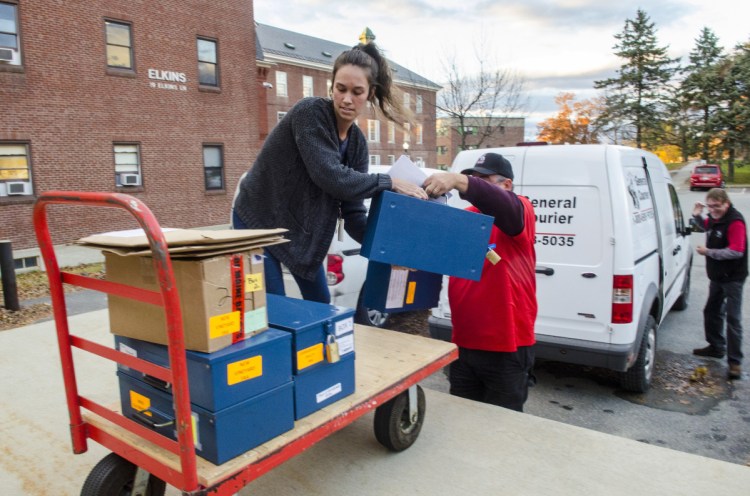The nation’s first ranked-choice runoff for a federal office got underway Thursday with the ballots in the tight race for Maine’s 2nd Congressional District starting to arrive in Augusta for retabulation and Rep. Bruce Poliquin noting he received the most votes on Tuesday.
“We won the Election-Night total,” Poliquin campaign spokesman Brendan Conley said in a statement. Although Poliquin won a plurality of the votes cast in the race Tuesday, he didn’t receive the majority required for victory under the ranked-choice system.
A first-round lead is noteworthy in part because in instant-runoff elections it is rare that subsequent rounds lead to a different winner. It is also considered a critical step for a candidate who might challenge the legality of ranked-choice voting, since there is no chance to win in court without first capturing a plurality.
Poliquin declined during the campaign to say whether he would abide by the results if ranked-choice voting determined the outcome. His opponents, Democrat Jared Golden and independents Tiffany Bond and William Hoar, said they would not challenge the results of a ranked-choice vote.
Poliquin and Golden each had roughly 46 percent of the votes cast Tuesday, but the Republican incumbent led Golden by 1,910 votes, 131,466 to 129,556, with 95 percent of the precincts reporting as of 9 p.m. Thursday, according to The Associated Press. Bond had 16,500 votes (6 percent) and Hoar had 6,933 votes (2 percent), the AP reported.
Golden’s campaign said it was watching the numbers carefully and monitoring the process being used by the Secretary of State’s Office, which will oversee the count.
“We await the results as the votes are being tabulated,” said Bobby Reynolds, the campaign’s spokesman.

Jared Golden, left, and Bruce Poliquin
Under ranked choice, the last-place candidate – likely Hoar in this race – is eliminated, the votes that candidate received are distributed to the second-choice candidates on those voters’ ballots, and the totals are retabulated. This happens until there are two candidates left and one has a majority – 50 percent plus one – of the votes.
Secretary of State Matthew Dunlap, speaking on Portland radio station WGAN on Thursday, said that couriers were picking up ballots from about 40 percent of the 2nd District towns that count them by hand. In the rest, he said, memory devices from the scanning machines they use will be sent because they contain images of the ballots.
He said counting could start Friday and likely would continue for “a few days,” including the weekend. The process will be open to the public.
In a radio interview with WGAN, Gov. Paul LePage said he believes that if the case does go to court “whoever won the plurality” will wind up in office, and he suggested Poliquin should go to court if he falls short in the final tally.
The governor opposed the system Maine voters approved in two ballot measures and said the ranked-choice option “needs to be taken down.”
Voters approved the new voting system for state and federal elections in a 2016 ballot question. Following an advisory opinion from the Maine Supreme Judicial Court in the spring, state elections were removed from the system because the Maine Constitution requires candidates for state offices to be selected by a plurality, but federal elections and primaries continue to use ranked-choice voting. Voters renewed their support for the ranked-choice system in June.
It is not yet clear what legal arguments might be made against ranked-choice voting if the results of the 2nd District race were challenged in court.
“I don’t think there’s any way they can win,” Rob Richie, president of Fair Vote, a Maryland group advocating election reform, said Thursday.
He said court cases around the country for years have consistently ruled in favor of ranked-choice voting arrangements.
But Maine Supreme Court Justice Donald Alexander said in an oral argument in the spring that one theory could be that the system violates the 14th Amendment’s equal protection clause that has led to the “one person, one vote” standard in American elections.
That argument has been made before – and been consistently shot down.
In Minnesota, for example, the state’s highest court found in 2009 that because “every voter has the same opportunity to rank candidates” and “each round every voter’s vote carries the same value,” there is no constitutional problem.
A U.S. Court of Appeals once ruled that ranked-choice voting is fine because “each ballot is counted as no more than one vote at each tabulation step.”
A Massachusetts court ruled in 1996 that voters are not denied equal opportunity with ranked-choice voting because all voters have the same chance “to cast a ballot at the same time and with the same degree of choice among candidates.”
Though ranked-choice voting hasn’t been used in a federal election before, some states have required candidates to win a majority before taking a state office – typically relying on special runoff elections between the two front-runners if nobody gets at least 50 percent of the vote – and it is used to determine mayoral races in Lewiston and Portland.
Supporters say it is a way to make sure every vote matters in the end. Detractors argue it is not fair or necessary.
For former legislator John Nutting, having voters make a second, third or subsequent pick while they are at the polling place is a sensible way to save money and prevent another month of painful television commercials.
Poliquin’s campaign, however, touted the success of traditional plurality elections.
“Maine’s long tradition of plurality elections has elected leaders such as Margaret Chase Smith, Olympia Snowe, George Mitchell, Bill Cohen and winners of Maine’s presidential elections,” the campaign said in its news release.
Send questions/comments to the editors.



Comments are no longer available on this story